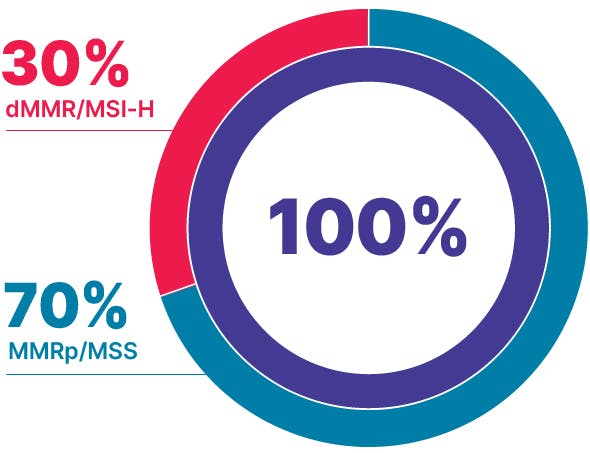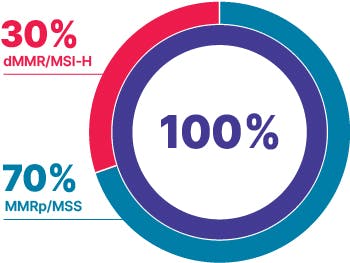JEMPERLI is a prescription medicine used to treat adults with a kind of uterine cancer called endometrial cancer. JEMPERLI may be used with the chemotherapy medicines, carboplatin and paclitaxel, and then after that JEMPERLI may be used alone when your cancer has spread outside your uterus (advanced) or your cancer has returned.
JEMPERLI can cause your immune system to attack normal organs and tissues in any area of your body and can affect the way they work.
JEMPERLI is a prescription medicine used to treat adults with:
- a kind of uterine cancer called endometrial cancer (EC)
- JEMPERLI may be used in combination with the chemotherapy medicines, carboplatin and paclitaxel, and then after that JEMPERLI may be used alone:
- when your cancer has spread outside your uterus (advanced), or
- your cancer has returned
- JEMPERLI may be used in combination with the chemotherapy medicines, carboplatin and paclitaxel, and then after that JEMPERLI may be used alone:
JEMPERLI is a prescription medicine used to treat adults with:
- a kind of uterine cancer called endometrial cancer (EC)
- JEMPERLI may be used in combination with the chemotherapy medicines, carboplatin and paclitaxel, and then after that JEMPERLI may be used alone:
- when your cancer has spread outside your uterus (advanced) or,
- your cancer has returned.
- JEMPERLI may be used alone:
- when a laboratory test shows that your tumor is mismatch repair deficient (dMMR), and
- your cancer has returned, or it has spread (advanced EC), and
- you have received chemotherapy that contains platinum and it did not work or is no longer working, and
- your cancer cannot be treated by surgery or radiation.
- JEMPERLI may be used in combination with the chemotherapy medicines, carboplatin and paclitaxel, and then after that JEMPERLI may be used alone:
- a kind of cancer that is shown by laboratory test to be dMMR solid tumor. JEMPERLI may be used alone to treat:
- cancer that has returned or has spread (advanced cancer) and,
- has progressed during treatment or after treatment, and you have no satisfactory treatment options.
- This use is approved based on how many patients responded to treatment and how long they responded. Studies are ongoing to confirm the clinical benefit of JEMPERLI for this use.
It is not known if JEMPERLI is safe and effective in children.
JEMPERLI is a medicine that may treat certain cancers by working with your immune system. JEMPERLI can cause your immune system to attack normal organs and tissues in any area of your body and can affect the way they work. These problems can sometimes become severe or life-threatening and can lead to death. You can have more than one of these problems at the same time. These problems may happen anytime during treatment or even after your treatment has ended.
JEMPERLI is a medicine that may treat certain cancers by working with your immune system. JEMPERLI can cause your immune system to attack normal organs and tissues in any area of your body and can affect the way they work. These problems can sometimes become severe or life-threatening and can lead to death. You can have more than one of these problems at the same time. These problems may happen anytime during treatment or even after your treatment has ended.
Call or see your healthcare provider (HCP) right away if you develop any new or worsening signs or symptoms, including:
Lung problems. Signs and symptoms may include cough, shortness of breath, or chest pain.
Intestinal problems. Signs and symptoms may include diarrhea or more bowel movements than usual; stools that are black, tarry, sticky, or have blood or mucus; or severe stomach-area (abdomen) pain or tenderness.
Liver problems. Signs and symptoms may include yellowing of your skin or the whites of your eyes, severe nausea or vomiting, pain on the right side of your stomach area (abdomen), dark urine (tea colored), or bleeding or bruising more easily than usual.
Hormone gland problems. Signs and symptoms may include headaches that will not go away or unusual headaches, eye sensitivity to light, eye problems, rapid heartbeat, increased sweating, extreme tiredness, weight gain or weight loss, feeling more hungry or thirsty than usual, urinating more often than usual, hair loss, feeling cold, constipation, your voice gets deeper, dizziness or fainting, changes in mood or behavior such as decreased sex drive, irritability, or forgetfulness.
Kidney problems. Signs and symptoms may include change in the amount or color of your urine, blood in your urine, swelling in your ankles, or loss of appetite.
Skin problems. Signs and symptoms may include rash; itching; skin blistering or peeling; swollen lymph nodes; painful sores or ulcers in your mouth or in your nose, throat, or genital area; fever or flu-like symptoms.
Problems can also happen in other organs and tissues. These are not all of the signs and symptoms of immune system problems that can happen with JEMPERLI. Call or see your HCP right away for any new or worse signs or symptoms. Signs and symptoms may include chest pain, irregular heartbeat, shortness of breath, swelling of ankles; confusion, sleepiness, memory problems, changes in mood or behavior, stiff neck, balance problems, tingling or numbness of the arms or legs; double vision, blurry vision, sensitivity to light, eye pain, changes in eyesight; persistent or severe muscle pain or weakness, muscle cramps; low red blood cells, bruising.
Infusion reactions that can sometimes be severe or life-threatening. Signs and symptoms of infusion reactions may include chills or shaking, itching or rash, flushing, shortness of breath or wheezing, dizziness, feel like passing out, fever, back or neck pain.
Rejection of a transplanted organ. Your HCP should tell you what signs and symptoms you should report and monitor you, depending on the type of organ transplant that you have had.
Complications, including graft-versus-host-disease (GVHD), in people who have received a bone marrow (stem cell) transplant that uses donor stem cells (allogeneic). These complications can be serious and can lead to death. These complications may happen if you underwent transplantation either before or after being treated with JEMPERLI. Your HCP will monitor you for these complications.
Getting medical treatment right away may help keep these problems from becoming more serious. Your HCP will check you for these problems during treatment with JEMPERLI and may treat you with corticosteroid or hormone replacement medicines. If you have severe side effects, your HCP may also need to delay or completely stop treatment with JEMPERLI.
Before receiving JEMPERLI, tell your HCP about all of your medical conditions, including immune system problems such as Crohn’s disease, ulcerative colitis, or lupus; received an organ transplant; have received or plan to receive a stem cell transplant that uses donor stem cells (allogeneic); have received radiation treatment to your chest area; have a condition that affects your nervous system, such as myasthenia gravis or Guillain-Barré syndrome.
If you are pregnant or plan to become pregnant, tell your HCP. JEMPERLI can harm your unborn baby. If you are able to become pregnant, your HCP will give you a pregnancy test before you start treatment. Use an effective birth control method during treatment and for 4 months after your last dose of JEMPERLI. Tell your HCP right away if you become pregnant or think you may be pregnant during treatment with JEMPERLI.
If you are breastfeeding or plan to breastfeed, tell your HCP. It is not known if JEMPERLI passes into your breast milk. Do not breastfeed during treatment with JEMPERLI and for 4 months after your last dose.
Tell your HCP about all the medicines you take, including prescription and over-the-counter medicines, vitamins, and herbal supplements.
The most common side effects of JEMPERLI when given with carboplatin and paclitaxel include nerve problems in your arms, hands, legs, and feet; tiredness; nausea; hair loss; joint pain; rash; constipation; diarrhea; stomach-area (abdomen) pain; shortness of breath; decreased appetite; urinary tract infections; vomiting.
The most common side effects of JEMPERLI when used alone include tiredness and weakness, low red blood cell count (anemia), diarrhea, nausea, constipation, vomiting.
These are not all of the possible side effects of JEMPERLI. Call your doctor for medical advice about side effects.
You are encouraged to report negative side effects of prescription drugs to the FDA. Visit www.fda.gov/medwatch or call 1-800-FDA-1088. You may also report negative side effects to GSK at https://gsk.public.reportum.com or 1-888-825-5249.
Please see full Prescribing Information, including Medication Guide for patients.



